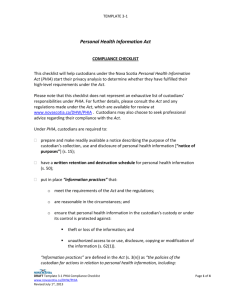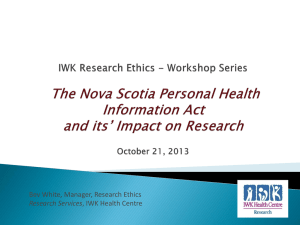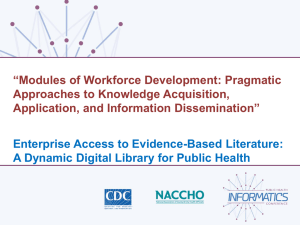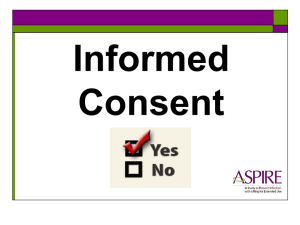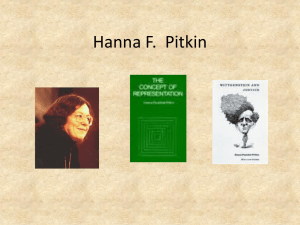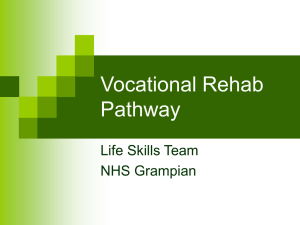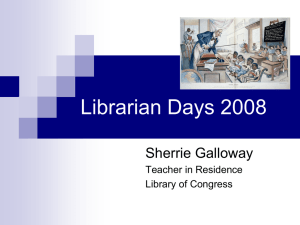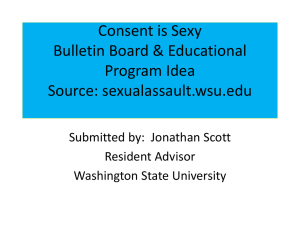Standard Presentation for Custodian Use
advertisement
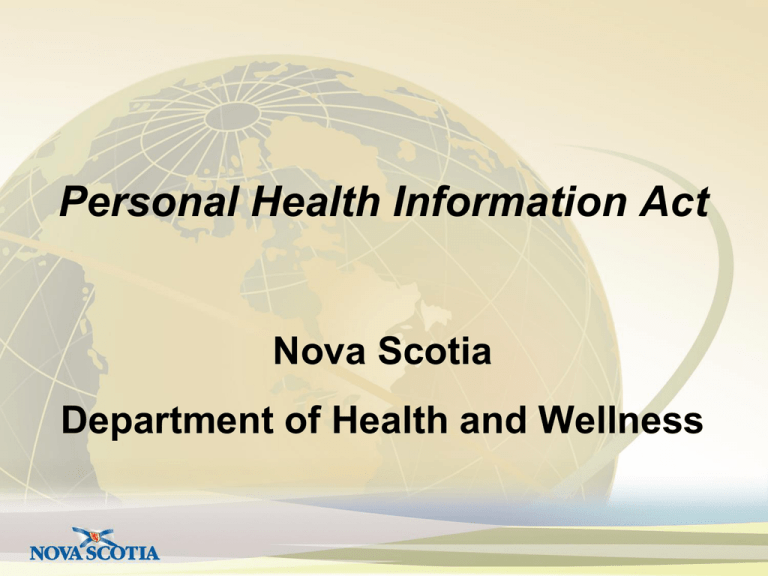
Personal Health Information Act Nova Scotia Department of Health and Wellness DISCLAIMER This presentation has been prepared by the Nova Scotia Department of Health and Wellness to assist custodians in understanding their roles and responsibilities under the Personal Health Information Act (PHIA). The content is the interpretation of the Department of Health and Wellness, and it is not intended to constitute legal advice. Presentation Overview • What is PHIA? • Purpose, scope and application of PHIA • What does it mean to be a custodian under PHIA? • Consent • Planning and management of the health system • Research • Offences and Penalties • Additional highlights of PHIA • PHIA Implementation • Next steps What is PHIA? • The Personal Health Information Act • Provincial legislation under the Nova Scotia Department of Health and Wellness • Passed in 2010 (Bill 89); amended in 2012 (Bill 76) • PHIA proclaimed and regulations approved in December 2012 • PHIA came into force on June 1, 2013 What is PHIA? • Aims to achieve a balance between an individual’s right to privacy and the benefits of use of personal health information • Includes provisions for: • collection, use, disclosure, destruction and disposal of personal health information • consent • information practices • access and correction • complaints • reviews Federal PIPEDA Privacy Act PHIA: Purpose “ …to govern the collection, use, disclosure, retention, disposal and destruction of personal health information in a manner that recognizes both the right of individuals to protect their personal health information and the need of custodians to collect, use and disclose personal health information to provide, support and manage health care.” PHIA s.2 PHIA: Scope PHIA applies to: • • • “custodians” “personal health information” “health care” Scope – who is covered? “Custodians” List of custodians is contained in PHIA • Department of Health and Wellness • District Health Authorities & IWK Health Centre • Regulated health professionals • Others by regulation Scope – who is covered? “Custodians” • Custodians must have “custody or control” of the personal health information • PHIA also applies to “agents” of custodians • Example: employees, volunteers, regulated health professionals with privileges, vendors What does it mean to be a “custodian”? • A custodian is accountable for the personal health information that it collects, uses and discloses for the provision of health care • A custodian has a legal obligation to protect personal health information within the requirements of PHIA What does it mean to be a “custodian”? • A custodian must have a contact person for PHIA to provide information on the rights of the individual • A custodian must consider requests for access to and correction of an individual’s personal health information • A custodian must implement and maintain a complaints policy What does it mean to be a “custodian”? • A custodian must prepare and make readily available a notice of purposes, which outlines the use and disclosure of an individual’s personal health information • A custodian must prepare and make available a written privacy statement outlining the custodian’s information practices, how to reach the contact person, how to make an access or correction request, and how to make a complaint What does it mean to be a “custodian”? • A custodian must have the ability to create and maintain a record of user activity for any electronic information system it uses to hold personal health information Scope – what is covered? • Applies to “personal health information” which means “identifying information about an individual, whether living or deceased…” • “Identifying information” means “information that identifies an individual or, where it is reasonably foreseeable in the circumstances, could be utilized, either alone or with other information, to identify an individual” PHIA s. 3 (f), 3(l) Scope – what is not covered? • • Does not apply to: • statistical information • aggregate information • de-identified information Also does not apply to information related to a provider (e.g. prescribing history) Scope – Health Care “Health Care” - an observation, examination, assessment, care, service or procedure in relation to an individual that is carried out, provided or undertaken for one or more of the following health related purposes: a) the diagnosis, treatment or maintenance of an individual's physical or mental condition, b) the prevention of disease or injury, c) the promotion and protection of health, Scope – Health Care d) palliative care, e) the compounding, dispensing or selling of a drug, health-care aid, device, product, equipment or other item to an individual or for the use of an individual, under a prescription, or f) a program or service designated as a health-care service in the regulations (e.g. Adult Protection assessments) PHIA s. 3(k) Consent Models Under PHIA Express consent • oral or written Knowledgeable implied consent • used only within circle of care Without consent • covered in sections 31 (collection), 35 (use) and 38 (disclosure) • custodian may collect, use and disclose without consent, but may also choose to seek consent Consent Standards Under PHIA Consent must: • be given by the individual or the individual’s substitute decision maker; • be knowledgeable; • be specific to the information at issue; and • be voluntary PHIA s. 13 Express Consent • Express consent is required for collection and use for: • fund-raising activities • market research or marketing any service for a commercial purpose Express Consent Express consent is required for disclosure: • from a custodian to a non-custodian* • from a custodian to another custodian for a nonhealth care purpose • fund-raising activities • market research or marketing any service for a commercial purpose • to the media • person or organization for research (s. 57) *unless required or authorized by law Knowledgeable Implied Consent “Unless this Act requires express consent or makes exception to the requirement for consent, knowledgeable implied consent may be accepted as consent for the collection, use and disclosure of personal health information.” (PHIA s. 12) • Knowledgeable implied consent is the basis for exchange of information between custodians within the “circle of care” “Circle of Care” • The term “circle of care” is not used in PHIA • Circle of care is a term commonly used to describe the ability of certain health information custodians to assume an individual’s knowledgeable implied consent to collect, use or disclose personal health information for the purpose of providing health care • Knowledgeable implied consent must still meet consent standards (Source: Circle of Care, Sharing Personal Health Information for Health Care Purposes, IPC Ontario,2009) Nurses Volunteers Physiotherapist (private) Physician (GP) Health Records Dietician Physicians EXPRESS CONSENT EXPRESS CONSENT District Health Authority Lab techs Knowledgeable implied consent Exceptions DHW initiative 25 Patient invokes s. 17 Limitation & Withdrawal of Consent • A patient may limit or revoke consent and custodians must take “reasonable steps to comply” with the request after receiving notice from the patient (s. 17) • “consent directives” and “masking” are terms used to describe the patient’s ability to limit or withdraw consent • These terms do not appear in PHIA Planning and Management of the Health System • PHIA permits custodians to disclose to Department of Health and Wellness and permits the Department of Health and Wellness to collect information without consent for planning and management of the health care system • Authority to plan and manage the healthcare system is limited to the Department of Health and Wellness Planning and Management of the Health System • However, any custodian may use personal health information without an individual’s consent for planning and delivering programs or services that the custodian provides or funds, allocating resources to any of them and monitoring or evaluating any of them PHIA s. 35(1)(a) Research • Rules for use of personal health information by custodian for research purposes include: • development of a research plan • Research Ethics Board approval • prior to commencement of research meets conditions of Research Ethics Board • research plan must address consent & specifically where consent is not being sought, an explanation as to why seeking consent is “impracticable” • Requirements regarding the use of information for research are new requirements for custodians Research A custodian may disclose personal health information for research without consent if: • An Research Ethics Board has determined that the consent of the individual is not required; and • The custodian is satisfied that: • the research cannot be conducted without using personal health information; • the personal health information is limited to the information necessary to accomplish the purpose of the research; • the personal health information is in the most deidentified form possible; Continued… Research • The custodian is satisfied that: • the personal health information will be used in a manner that ensures its confidentiality; • it is impracticable to obtain consent; and • the custodian informs the provincial Review Officer Offences and Penalties • The legislation includes penalties for offences under the Act • Offences include collecting, using or disclosing personal health information in contravention of the Act or regulations; willfully altering or destroying records; and obstructing the Review Officer • Penalty for an individual: a fine of not more than $10,000 or imprisonment for six months, or both • Penalty for a corporation: a fine of not more than $50,000 Additional Highlights • Custodians shall limit the collection, use and disclosure of personal health information to what is required to meet the need and only allow access to the information that employees, vendors etc. “need to know” to do their job Additional Highlights • Restrictions on who can collect health card number • Only custodians or those authorized by regulation are permitted to collect the health card number Additional Highlights • Custodians shall have retention schedules and ensure they are followed • Retention schedules apply to personal health information in paper and electronic form Additional Highlights • Independent privacy oversight is required under PHIA • Privacy oversight authority lies in Privacy Review Officer Act • The provincial Review Officer can conduct reviews or initiate investigations • The provincial Review Officer has recommendation-making power Additional Highlights • Requirement to report to an individual any breach of their personal health information where there is potential for harm or embarrassment • Custodians are required to notify the Review Officer in cases where they do not report the breach to the individual Additional Highlights • PHIA protects documents subject to solicitor-client privilege • The provincial Review Officer cannot compel production of records to determine if the claim of solicitor-client privilege is valid Implementation: Regulations • Regulations approved in December 2012 • Regulations include: • definitions (e.g. electronic health record) • designating a program or service as a health care service (e.g. Adult Protection assessments) • authorizing specific non-custodians to collect health card number (e.g. schools collect for facilitating emergency care for students) • maximum fees permitted to be charged by a custodian to an individual requesting to view or have a copy of his/her own record Implementation: Communications • Communications and education tools include: • Toolkit for custodians (including templates) • PHIA website • FAQs • Toll-free inquiry line and PHIA e-mail • Educational videos • DHW fact sheet/poster on PHIA • Standard presentation on PHIA Implementation: Toolkit for Custodians • To support custodians with their understanding of their obligations under PHIA • General reference, best practices and templates: • • • • • • • • • • • Complying with PHIA PHIA and PIPEDA Duties of a Custodian Consent, Capacity and Substitute Decision-Making Collection, Use and Disclosure Access to and Correction of Personal Health Information Research Electronic Health Record/Electronic Information Systems Complaints under PHIA The Review Officer, Reviews and Mediation Offences and Penalties Next Steps • Further information on the Personal Health Information Act is available on the Department of Health and Wellness PHIA website • DHW – Privacy and Access Office will continue to work with custodians to ensure they are ready for PHIA Toll-free inquiry line 1-855-640-4765 or 424-5419 Website www.novascotia.ca /DHW/PHIA E-mail phia@gov.ns.ca Questions and Discussion
